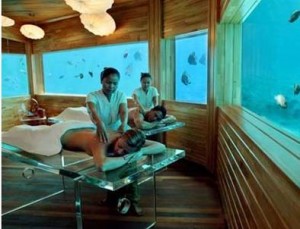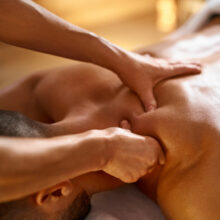Lessons from the Maldives Spa Saga
- Published: Friday, January 6th 2012
- in Spa
 Surprise, Shock, Confusion, Anger, Sadness, Relief, Perspective, Pride, Advocacy
Surprise, Shock, Confusion, Anger, Sadness, Relief, Perspective, Pride, Advocacy
This sums up the range of my emotions and thoughts from the moment I read the first report that spas in the Maldives were being forced to close because of Islamic extremists’ accusations that they are fronts for prostitution – to today when I see that the ban has been lifted.
My memory of the Maldives is, I believe, similar to the memories of many who have been lucky enough to visit this magnificent collection of islands (1,192 to be exact, of which approximately 200 are inhabited). The Maldives have always been seen as a magical place and the spas developed there offer awe-inspiring experiences. Imagine massage beds over glass floors where you can watch the fish swim while you are getting your treatment or the famous “underwater massage room.” And then there are the white sandy beaches, exotic villas on stilts, turquoise water, pink coral and the lovely and gracious Maldivian people. It is truly a vacation paradise.
While it took only about a week from the time the spa closings were announced until a (hopefully final) resolution was reached, the repercussions are likely to last much longer. The positive is for the spa industry which will benefit from its new position as a “must have” vacation amenity and a “don’t mess with us if you want to keep tourism going” status. Unfortunately, I am afraid it will be a negative for the Maldives’ tourism industry; political instability has been spotlighted in a place where before this incident most people never gave it a thought. I venture to guess that most people didn’t even know that the Maldives had a rising fundamentalist Islamic movement (me included).
Here is bit more detail on my reaction to this disturbing news. I’d love to hear your thoughts on this topic – and what it means for our industry.
First, surprise. The announcement seemed to come out of nowhere and because the news broke during the end-of-year holidays, it didn’t initially attract much attention. Surprise turned to shock as I read the next day’s report – the ban was really happening. And it didn’t just apply to a few brothels in Malé (the densely populated capital city). After all, we have the occasional problem here in the U.S. when a few so-called “spas” are found to be fronts for prostitution, but it’s pretty much a non-issue the next day. The ban in the Maldives however applied to all spas – including the luxury resort spas across all the islands – including the places I had visited!
Digging in a bit further, I found it all quite confusing. There was a protest by opposition leaders; in response, the government (and the ministry of tourism) ordered the shut-down of all spas. That didn’t make a lot of sense to me especially since I know that Ministries of Tourism are – naturally – all about tourism and this move would surely stop it dead in its tracks. Spa experiences in the Maldives are not just “add-ons” to people’s vacations. For most they are the vacation! In fact, the word “Maldives” and “spa” are almost interchangeable.
Later, I received an email from a colleague in the U.K. asking me for my thoughts on the matter. Since I was in my “confusion” state, I decided that I needed to learn more before responding to her. I am not one who wants to contribute to the fanning of flames of hysteria so I decided to wait – hoping this would all go away quickly and quietly. I also initially decided not to blog or comment about this issue so that I didn’t harm the Maldives’ resorts and spas by spreading the message. Then I saw that USA Today carried the story. Bummer.
I suppose it was inevitable with today’s instant access to news that something like this would not be able to fly underneath the radar for long. Between the Internet, social media and now a major newspaper carrying the story – it was too late for it to become a “non-issue.” Additional information explained that the government ordered the shut down in retaliation for a protest from the opposition they point out as extremists. Apparently the government knew this would be devastating and that this would then reflect poorly on the opposition. In time, my confusion turned to anger. Now it was big news and the impact for the Maldives a definite; potential travelers began cancelling trips and travel agents were starting to suggest other locations. How sad for the Maldivians, for the resorts, for vacationers already there and for the hundreds who might need to change their plans and the thousands (or even millions) who might cross the Maldives off their “bucket list.”
Sadness turned to relief this morning, however, when I read that the ban had been lifted per government announcement from the president. It will mitigate some of the damage…unfortunately, not all of it.
I’ve had just a bit of time now to put some of this into perspective and think through the implications. I realized that one incredibly positive factor from all of this is the affirmation that the spa industry is very important to tourism globally. I especially liked this quote from The UK’s Daily Mail, “…removing the spa element from a Maldivian holiday is like removing the Eiffel Tower from Paris (or) the Colosseum from Rome.” Indeed!
SpaFinder has tracked the development of the spa industry over the last 25 years and each of our annual “State of Spa Travel” survey shows huge increases in the importance of spa to a traveler’s decision-making. Now much of the rest of the world knows that too. Other attempts at shutting down spas would likely have the same consequence: a huge negative reaction and a major plummet in tourism. That’s a significant economic impact that most countries will not want to risk.
So my relief turned to a sense of pride – pride that our industry has become a true contributor to people’s health and well-being and that spas are now a critically important part of the vacation experience. So much so that, not only do consumers want and demand spa services, leaders in government and businesses recognize their value as well.
Finally, I think about what our industry can and should do going forward to make sure this doesn’t happen again. My thoughts turn to advocacy and the importance in taking some positive pre-emptive steps.
1) The first being to educate one another about scientific evidence supporting the health benefits of spa modalities. That’s why www.spaevidence.com is so important. Spas should link to it; spa professionals should become familiar with it and introduce it to their clients.
2) We should encourage more clinical trials and research regarding spa therapies.
3) We need to trumpet that spas are about more than just massage; spas are about exercise, good nutrition, reducing stress, and the value of therapeutic services and beauty treatments.
4) And then there is the prostitution issue. Our industry needs to recognize this problem as a part of our history and not so distant past. We need to combat this by making sure we have good staff, excellent training programs, high standards and practices, certification and licensing and a commitment to zero tolerance.
5) We need to have a process to help educate prospective future spa professionals (and their parents) about the honorable position of working in this industry. (I think using the term massage therapist rather than masseuse and masseur is another small – but important step.)
6) Furthermore it helps to honor local traditions (such as the Maldivian sand massage or the Islamic hammam) to promote a global understanding of people’s customs for health, relaxation and healing.
And finally, let’s rally around our spa friends in the Maldives and spread the word that this little slice of heaven on earth has been nimble and quickly righted a wrong. Bravo for them. The Maldives is back on my travel schedule for another visit – hopefully soon!



